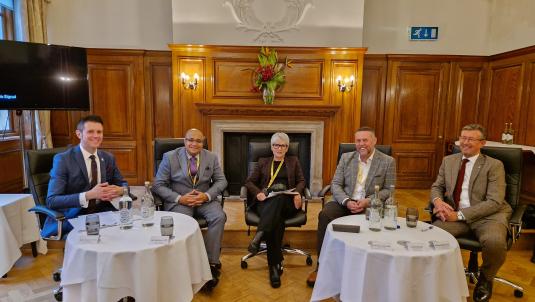
Against the backdrop of impending waste regulations set to take effect in March 2025, the event underscored the critical need for collaboration and innovation to address the 1.1 million tonnes of annual food waste generated by the UK hospitality and food sectors.
The panel featured a distinguished lineup of speakers, including Robert Richardson, CEO of the Institute of Hospitality; Philip Shelley, Senior Operational & Policy Manager and the National Lead for Net Zero Food at NHS England; Lorraine Jarvie, General Manager of the Royal Crescent Hotel; Raj Chakraborty, Regional General Manager at Macdonald Hotels & Resorts; and Grant Keenan, Managing Director of Keenan Recycling.
Uniting leaders for change
Robert Richardson kicked off the discussion by emphasising the importance of collective action. "Sustainability isn’t a spectator sport—it’s a collective effort. For every two tonnes of food consumed, another tonne is wasted. Achieving carbon neutrality by 2024 is no small feat, but with the right tools and teamwork, it’s within reach."
Robert further underscored the gravity of the situation. "Sustainability is no longer a ‘nice-to-have’; it’s an expectation from our customers and communities. To meet these expectations, we need to focus on education, transparency, and collaboration, not just within our own teams, but also with our local communities and across industries."
Philip Shelley highlighted the importance of sustainable sourcing and eliminating food waste. "In the NHS alone, between £26 and £30 million of food is wasted annually. Menus should reflect the region and the season. We don’t want to see strawberries on the menu in December—menus should reflect the region and the season. Embracing sustainability is about more than just cost; it’s about responsibility. It’s about being proud of where we are."
"Scotland and Wales have amazing practices, and it’s frustrating when we see gaps across regions. Sharing and learning from each other is key to progress," he added.
Lorraine Jarvie shared insights into the challenges of achieving sustainability in historic cities like Bath. "Listed buildings present unique challenges for carbon neutrality, but progress is being made. Initiatives like using renewable energy and cycling companies to collect food waste are making a tangible difference. If a historic city like Bath can lead the way, it sets an example for others."
On balancing expectations with sustainability, Lorraine added: "There is an expectation at a five-star hotel -- fresh towels, changed bedding. But more and more, people are understanding that these practices aren’t always the best for the environment. Guests are now asking about our sustainability efforts."
Raj Chakraborty highlighted the growing consumer demand for sustainability. "I was shocked to learn that 43% of global travellers would pay more to stay in a sustainable property. This shift in consumer expectations drives the need for bold action—from reducing landfill waste to prioritise local and sustainable practices."
"Seasonality is the key. We must respect nature’s cycles; I’m not going to serve fish that’s out of season, and it’s a commitment we expect from our suppliers too. We’ve transformed our supply chain. Each region now has its own local suppliers, and all deliveries must use electric vehicles—no diesel or petrol trucks allowed on our properties. Shared vehicles now bring in both meat and fish to reduce emissions. It’s about finding innovative ways to cut back every ounce of waste," added Raj.
How Keenan Recycling leads the charge
As the hospitality industry prepares for the upcoming Simpler Recycling regulations, Keenan Recycling is well-positioned to guide businesses toward compliance and sustainability. With 24 depots across the UK and a mission to turn food waste into renewable energy through anaerobic digestion, Keenan Recycling exemplifies innovation in waste management.
Grant Keenan, Managing Director, shared the company’s commitment to sustainability:
"We’ve become a really wasteful society. My parents’ generation, especially during wartime, wasted nothing. Everything was utilised. But over the years, as wages increased and food became cheaper, it’s become disposable. We’ve lost our way."
"It’s criminal that food gets thrown away when there are people who need to eat. Organisations like FairShare, Too Good To Go, and Olio are critical. As much as my business is about recycling food waste, that should be the last resort."
Grant expanded on the outreach work carried out by Keenan Recycling. "We go into primary schools and give free food waste collections. Kids scrape their plates into bins, and we show them how that waste is turned into gas via anaerobic digestion or compost for their eco-gardens. It’s these little kids who go home and tell their parents, 'Stop! Don’t do that!' They’re driving generational change."
Looking ahead
The event concluded with a sense of optimism. Attendees recognised the growing cultural norm of sustainability as a vital part of business success. With customers increasingly seeking eco-conscious brands, adopting sustainable practices is not only ethical but also a sound economic strategy.
For more information on how Keenan Recycling can help businesses prepare for the Simpler Recycling regulations, visit: keenanrecycling.co.uk/news/navigating-the-new-food-waste-legislation-in-england/
